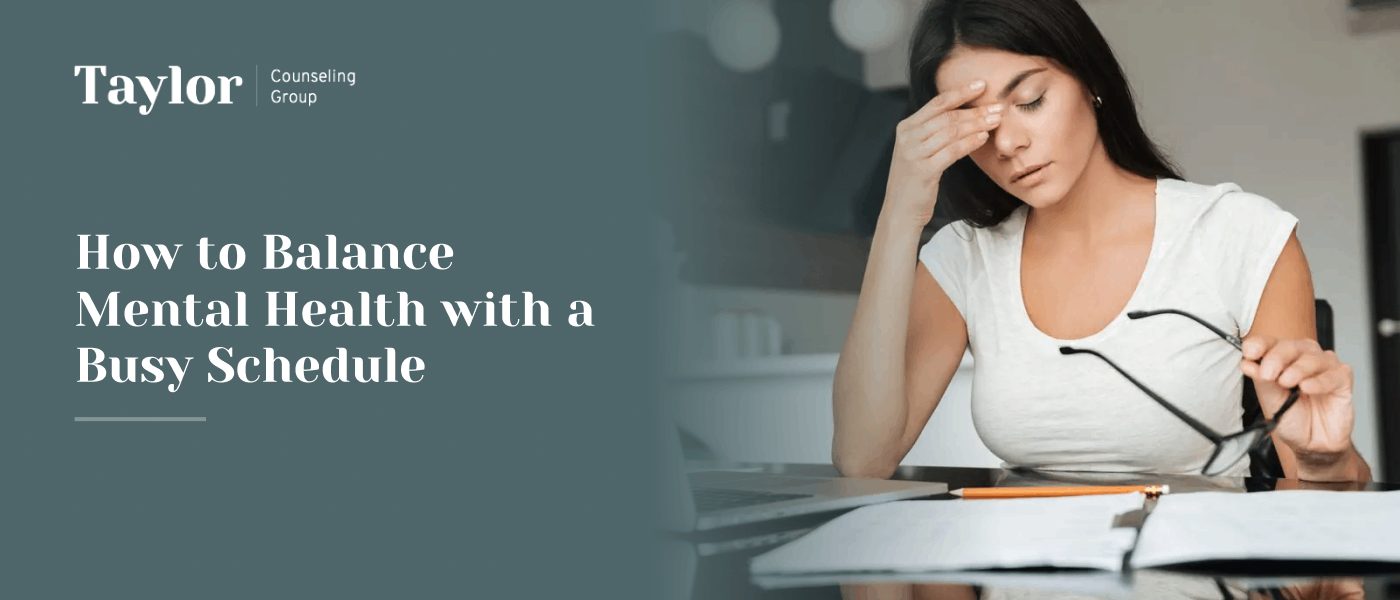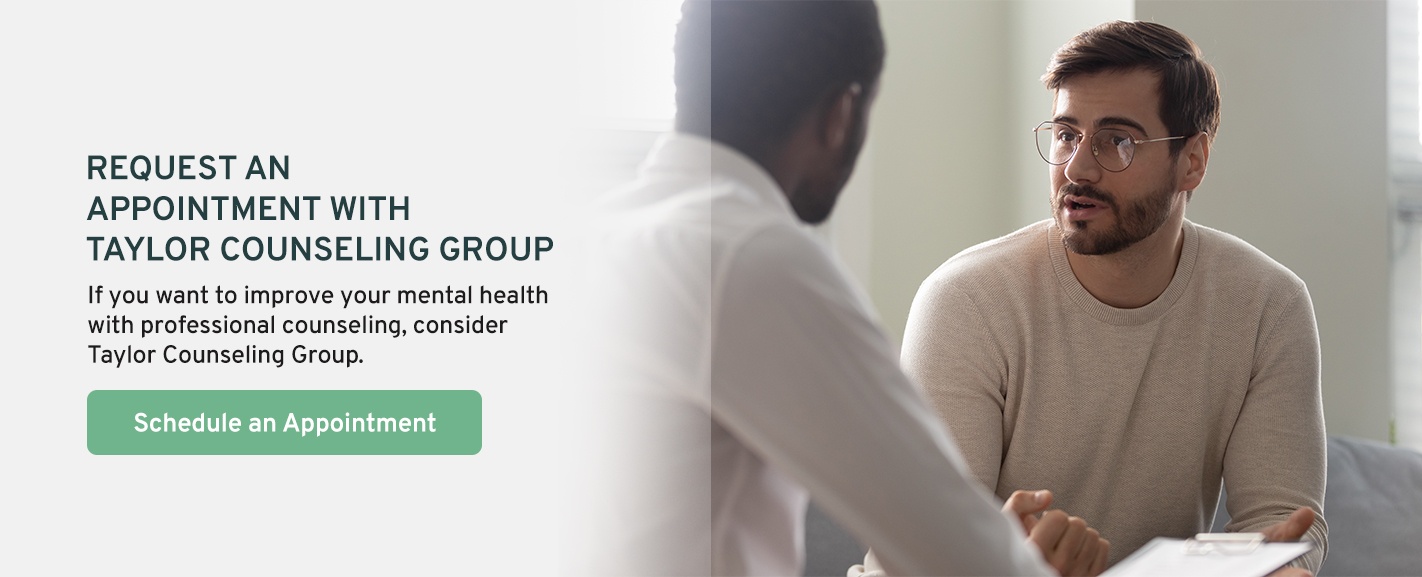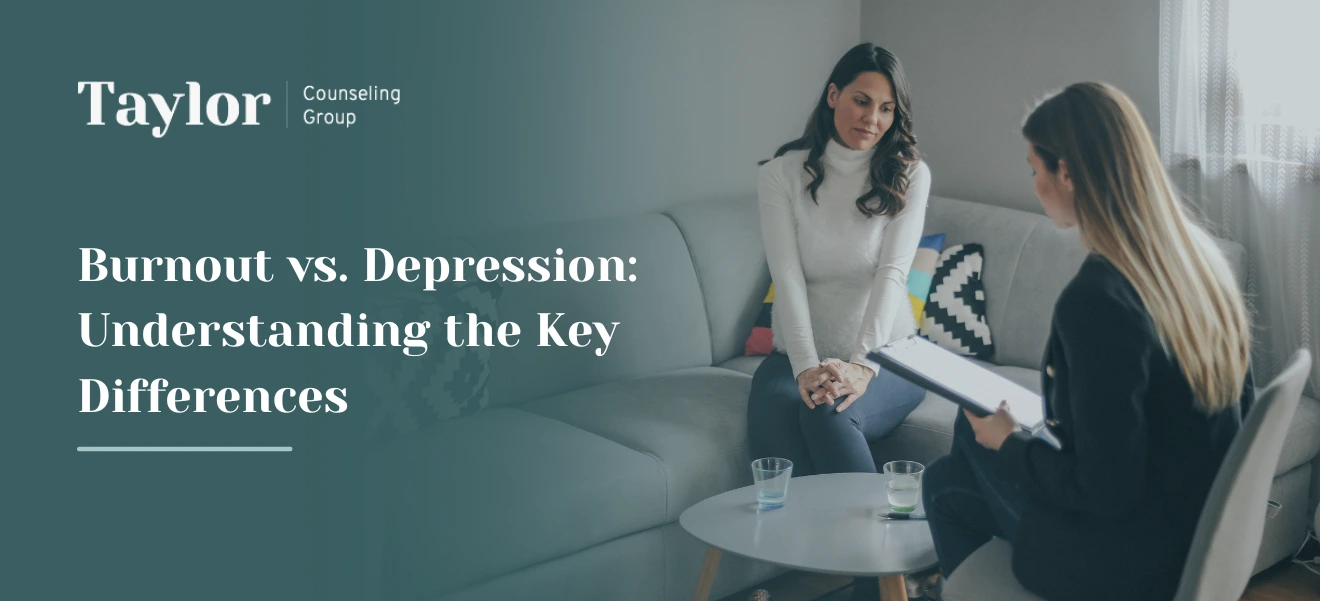Life today is great in many ways, but it’s also nonstop. Between work, family, social obligations, and personal goals, mental health tends to fall by the wayside.
And the impact is clear. As of August 2024, 31% of adults worldwide said stress was the biggest health issue in their country. In the U.S., nearly half of adults admit that stress has taken a toll on their behavior.
At Taylor Counseling Group, we believe your mental health matters just as much as everything else on your to-do list. Fortunately, you don’t need hours of meditation or week-long retreats to stay balanced. Small, intentional shifts can help you manage stress, avoid burnout, and feel more in control of your life.
Here’s how you can take care of your mental health, even with a busy schedule.
9 Strategies to Balance Mental Health with a Busy Schedule
When your mind is in a good place, everything else feels easier to handle. Try these simple, effective strategies and see what works best for you.
1. Prioritize Self-Care
Adults can be too focused on others to make time for themselves. Some even feel guilty at the thought of putting their needs first.
But you can’t pour from an empty cup. Checking in with your own needs and emotions puts you in a better place to support the people around you.
Every day, set aside time for self-care activities like:
- A quick walk or ten-minute stretch
- Deep breathing or guided meditation
- Reading, journaling, or listening to music
Build these habits into your routine, so you don’t have to go out of your way to do something for yourself.
2. Set Realistic Goals
Trying to do everything at once is a fast track to burnout. Instead of aiming for huge, vague goals, break them down into smaller, manageable steps. This makes it easier to track progress, stay motivated, and avoid the frustration of feeling stuck.
For example, instead of saying, “I need to finish this big project today,” try, “I’ll complete the first two sections today and finish the rest tomorrow.”
Also, give yourself grace. Progress is better than perfection. Some days will be more productive than others- and that’s okay.
3. Practice Mindfulness and Meditation
If you feel like your mind is constantly bouncing between tasks, responsibilities, and everything on your plate, mindfulness can help. Just a few meditation techniques and a bit of focused breathing can quiet the noise, boost self-awareness, and reduce stress.
Not sure where to start? Apps like Empifany or Calm offer simple guided sessions to help you ease into the practice.
4. Establish Boundaries
Blurring the lines between work and home life can quickly lead to stress, especially in a remote work setup. If you’re constantly checking emails after hours, saying yes to every request, or letting obligations creep into your personal time, it won’t be long before your mental well-being takes a hit.
To avoid stretching yourself thin:
- Honor your work hours.
- Learn to say no and protect your time without guilt.
- Create a buffer between work and personal time. A short walk, a workout, or even just changing clothes after work can help shift your mindset.
- Set “Do Not Disturb” periods to focus on yourself without interruptions.
5. Utilize Time Management Techniques
In most cases, feeling overwhelmed has less to do with how much you have on your plate and more with how you manage your time. Effective time management can help you stay productive without running yourself to the ground.
Start each day with a list of what needs to get done and tackle high-priority tasks first. Use a planner to set dedicated time slots for work, breaks, and personal activities.
Minimize distractions as much as possible. If you’re feeling drained, step away from your desk for a quick reset—but don’t let a short break turn into an hour of procrastination.
6. Seek Support and Connections
Ever notice how a quick chat with a loved one can instantly lift your mood? We rely on social connections for support, perspective, and a sense of belonging. Friends and family can provide encouragement, reassurance, and a listening ear when you need it most.
If you don’t have a strong support network within your circle, consider joining an in-person or online group. Talking to people who have gone through similar experiences can provide comfort, insight, and a space to express yourself without judgment.
Schedule An Appointment Online Today
7. Incorporate Physical Activity
Physical activity is a tried-and-true way to support mental health. Exercise releases endorphins —your body’s natural stress relievers—while also promoting better sleep and sharper focus.
Too busy to spend an hour in the gym? Incorporate short bursts of movement- like a brisk walk, stretching between meetings, or taking the stairs instead of the elevator- in your day-to-day.
Just standing up and moving for a few minutes every hour can help you stay energized and focused.
If you struggle with consistency, turn movement into a social activity. Walk with a friend, join a class, or play a sport to make exercise more enjoyable.
8. Limit Technology Use
Nearly 1 in 3 U.S. adults (31%) who use social media admit to doomscrolling either “a lot” or “some.” While scrolling through social feeds can be entertaining, it’s best to take a step back from technology sometimes.
A digital detox doesn’t mean cutting out technology completely—it’s about setting limits that work for you. Try designating tech-free times during meals, before bed, or first thing in the morning to start and end your day without a screen. You can also create tech-free zones in your home, like the bedroom or dining area.
If you find yourself mindlessly scrolling, set app limits or use a screen time tracker. Also, instead of defaulting to your phone during downtime, replace it with an offline activity. Read a book, go for a walk, or have an actual conversation with a friend.
9. Schedule Regular Counseling Sessions
You might be at a point where DIY self-care isn’t enough. Therapy can help you work through work stress, relationship struggles, or anything else you may be dealing with.
Even if you feel like you’re managing well, regular counseling sessions can offer guidance, fresh perspectives, and customized, research-backed coping strategies for your needs.
Put Your Well-Being First with Taylor Counseling Group
While it can be hard to fit self-care into your already hectic day, we hope this post has shown you how it is done.
If stress or anxiety is becoming too much to handle alone, the professionals at Taylor Counseling Group are here to help. Our individual counseling services provide personalized support to help you navigate challenges, build resilience, and create a healthier, more balanced life.
We’re committed to providing high-quality care that fits your needs and budget. Contact us today to schedule an appointment.



 Family Counseling Can Help
Family Counseling Can Help


